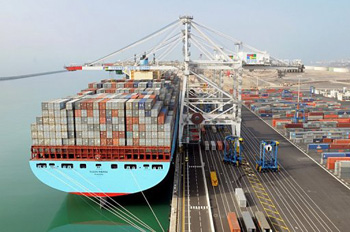
US authorities sued the Danish group’s shipping branch Maersk Line for having used ships registered in the United States to carry commercial cargo to Sudan and Iran between January 2003 and October 2007, thus breaching Washington’s embargo on the two countries.
According to the ruling by the US Treasury’s Office of Foreign Asset Control (OFAC), the company provided 4,714 shipments of cargo originating in or bound for Sudan and Iran in that period.
The shipping company had risked fines of more than 60 million dollars for the violations, according to the OFAC.
A Maersk spokesman in the United States, Kevin Speers, acknowledged there had been breaches and said the company had negotiated to pay a smaller amount to avoid litigation.
“We recognise our obligation to respect trade sanctions and laws in the countries we operate in and we regret the violations,” Speers told AFP.
In the case of Iran, he insisted that “none of the US flagged ships (went to) Iran.”
“What happened is that cargo that was either imported or exported in Iran at some point of time was placed on an American flagged ship” belonging to Maersk, “but not in Iran,” he stressed.
When it came to Sudan, however, the situation was different.
“Maersk had a waver from the US government to deliver US Food Aid into Sudan so the US-flagged ship was in Port Sudan to deliver humanitarian aid,” Speers said.
But “the booking systems did not identify cargo that was coming on and off the ship and that could be of violation of the embargo,” he added.
The US government imposed a trade embargo on Sudan in 1997 due to human rights violations linked to the civil war between the north and south of the African country, and also because of the regime’s alleged support of international terrorist groups.
The trade embargo against Iran meanwhile came during the Ronald Reagan administration in 1987 after initial sanctions against the nascent Islamic republic in 1979 had already been tightened in 1984.
According to Maersk spokesman Speers, the shipments in question contained “commercial cargo” and “nothing of a sensitive nature.”